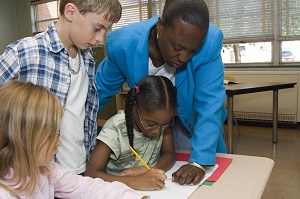
Relationships are essential to fostering equity and excellence in our schools and classrooms. Social and emotional learning (SEL) programs are one of the vehicles that can be used to establish genuine, caring relationships throughout school communities. SEL programs that have a whole-school implementation model and are purposeful about infusing culturally-responsive curricula further enhance the positive impact on schools. It is proven that we learn best when we are in environments in which we feel cared for and connected to others. Research has demonstrated that children who have a positive connection with at least one adult stay in school longer, make better decisions, and have better life outcomes overall. Let’s be honest, when adults work in environments in which they have positive connections and feel cared for and valued, they perform better and their employers experience less turnover. Positive relationships are good for all of us.
As we research and think about our educational system and the gaps that exist for black and brown children, SEL programming has to be a critical component of the discussion. SEL programs, such as Open Circle, which include a whole-school implementation model, not only provide curricula for SEL skill building for students but also include professional development for SEL skill building and consciousness raising for all adults in the school community and at home.
The guiding principles on which Open Circle is grounded provide an important framework for thinking about teaching and learning. The importance of relationships to cognitive and social growth, the importance of teaching SEL skills, and the importance of adults as models are the critical underpinnings of our work.
The importance of relationships to cognitive and social growth
Educators have known for a long time that “[children] don’t care how much you know until they know how much you care.” - Theodore Roosevelt When we show genuine care and concern for our students and their experiences, inside and outside of the classroom, and when we take the time to truly get to know and understand them, we are creating fertile ground for learning and engagement to take place.
The importance of teaching SEL skills
In my work as an educator in the Suffolk County House of Correction one of the things that struck me was how insightful and intelligent my students were. When I would ask them about their experiences in school, one theme that emerged was that being challenged by academics was not the thing that pulled them off a more positive path, but rather feeling ill-equipped to navigate and manage the social dynamics of school, family and community led to choices and situations that resulted in their involvement with the criminal justice system. Taking time out weekly to focus on SEL skill building is critical to equipping our students with the necessary competencies to cope with, manage, and rise above the daily challenges many face.
The importance of adults as models
The old adage of “do as I say and not as I do” has never been true. Parents and adults who work with children can attest that no matter what you say, children will more likely mimic what they see you do. This fact is important for caregivers and it is equally as important for educators and administrators. Taking time to invest in the quality of adult relationships and the modeling of those positive relationships is critical to this work. The student community mimics the adult community in many ways. If there is derision, gossiping, unfriendliness or devaluing among the adults, the same will hold true for the students. These ways of being permeate the space and gives it an unwelcoming, unsafe, and tense feel. Honoring our strengths, being curious and open to learn about our differences, and being honest about what we know and don’t know all contribute to the development and nurturing of positive relationships among the adult community.
By offering training for administrators, specialists and support staff, grade-level teachers, and families, Open Circle is recognizing that it does in fact “take a village.”
So as we continue the dialogue on how to fill the gaps in educational opportunity and achievement let’s not forget to start with the basics. Relationships, positive and genuine relationships, set the foundation for creating schools and classrooms in which all students and educators feel safe, cared for and engaged to do their best learning and teaching. Social and emotional programming is a means to this end. Open Circle offers the most comprehensive means of getting there.
Kamilah Drummond-Forrester joined Open Circle as a Program Manager in June 2013. She is the co-founder of the Dorchester Collegiate Academy Charter School (DCA) in Boston, MA. Kamilah served as the school’s first board chair and later became the Director of Wellness to work directly with students. She oversaw the social and emotional programming at the school. This included developing the social and emotional curriculum, coordinating services with outside mental health and social service agencies, as well as working directly with students and families.
When you subscribe to the blog, we will send you an e-mail when there are new updates on the site so you wouldn't miss them.
Comments